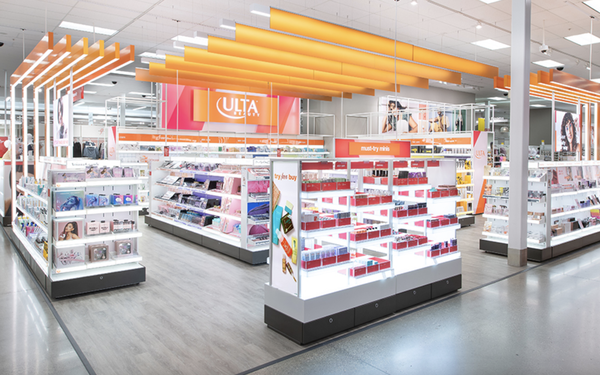
Just months ago, Ulta Beauty’s
ambitious expansion plans with Target seemed solid. Now, Ulta is pulling back -- and retail insiders are wondering why.
The beauty retailer, once bullish on expanding the shop-in-shop strategy
to more than 800 Target locations, is hitting pause. Last week, Ulta’s new CEO, Kecia Steelman, told investors at a JP Morgan conference that the company would not pursue additional Target
buildouts.
“Ulta Beauty at Target continues to be a meaningful way we meet guests where they are, offering convenient access to the best in beauty and wellness,” Steelman
reportedly told attendees. “We remain focused on working with our partners at Target to optimize the experience in our more than 600 existing shop-in-shop locations and identify the most
strategic opportunities for future growth.”
advertisement
advertisement
The announcement surprised observers. Since launching the partnership in 2020 and opening the first 100 locations in 2021, Ulta at Target has
been seen as a growth engine for both companies. The arrangement helped Ulta compete with Sephora’s presence in over 1,000 Kohl’s stores. And Ulta has consistently claimed the Target
connection complements, rather than cannibalizes, its standalone stores by reaching a different kind of customer.
For Target, which has prioritized beauty and wellness as key growth
categories, the Ulta installations have added credibility, excitement, and foot traffic.
Despite a recent sales slowdown, Ulta continues to earn praise from analysts. Deutsche Bank’s
Krisztina Katai recently added the Bolingbrook, Illinois-based company to the investment company’s “Fresh Money” list, which highlights companies poised to outperform. “The
setup for ULTA in 2025 and beyond is favorable,” she wrote, citing strong promotions, new products, improved store execution, and the upcoming launch of an online marketplace.
Katai also
noted that Steelman’s promotion to CEO could give the brand new momentum. “She brings valuable experience and a heightened sense of urgency to support strategic objectives and put Ulta
back on a path of market share gains.”
What this move means for Target is less clear. The Minneapolis-based retailer continues to double down on beauty, in February announcing the debut
of 2,000 new products and nearly 50 new brands, 90% priced under $20.
In its most recent quarterly results, Target reported beauty sales of $3.44 billion, a 0.58% increase from $3.42 billion
in the fourth quarter of 2023. But total revenue fell to $30.91 billion, down from $31.91 billion the previous year. Comparable sales rose 1.5%.
The company issued a cautious forecast,
predicting flat sales for the year ahead. While Target cited general consumer uncertainty, the retailer may also be feeling the sting of sustained backlash to the retailer’s rollback of
diversity, equity, and inclusion initiatives.
The store has become a particular target of boycotts. One such campaign, launched during Lent by Atlanta megachurch pastor Rev. Jamal Bryant,
called for a 40-day boycott of the retailer. “We’re asking people to divest from Target because they have turned their back on our community,” Bryant told CNN.
While critics
often question the impact of such boycotts, early data suggests this one may be moving the needle. According to Placer.ai, Target store traffic has declined for eight consecutive weeks, falling 6.5%
in March. By comparison, Walmart traffic dipped 3.8%, McDonald’s 1%, and Starbucks 2%. Meanwhile, Costco — a company some credit with standing firm on DEI — saw traffic jump 7.5%.
Best Buy also rebounded, with a 1.4% increase.
Target is banking on a bump from its latest high-profile designer collaboration: a 300-piece Kate Spade New York collection launching next week.
But that brand, too, has been struggling. Tapestry recently named a new CEO to turn around Kate Spade, which had a 10% sales decline in the most recent quarter.
“I have no doubt it will
be joyful because Kate Spade is known for color and known for prints,” said Jane Hali, CEO of Jane Hali & Associates, in an interview with Retail Dive. “It should be good, but
it’s not enough to change the course of Target’s business.”